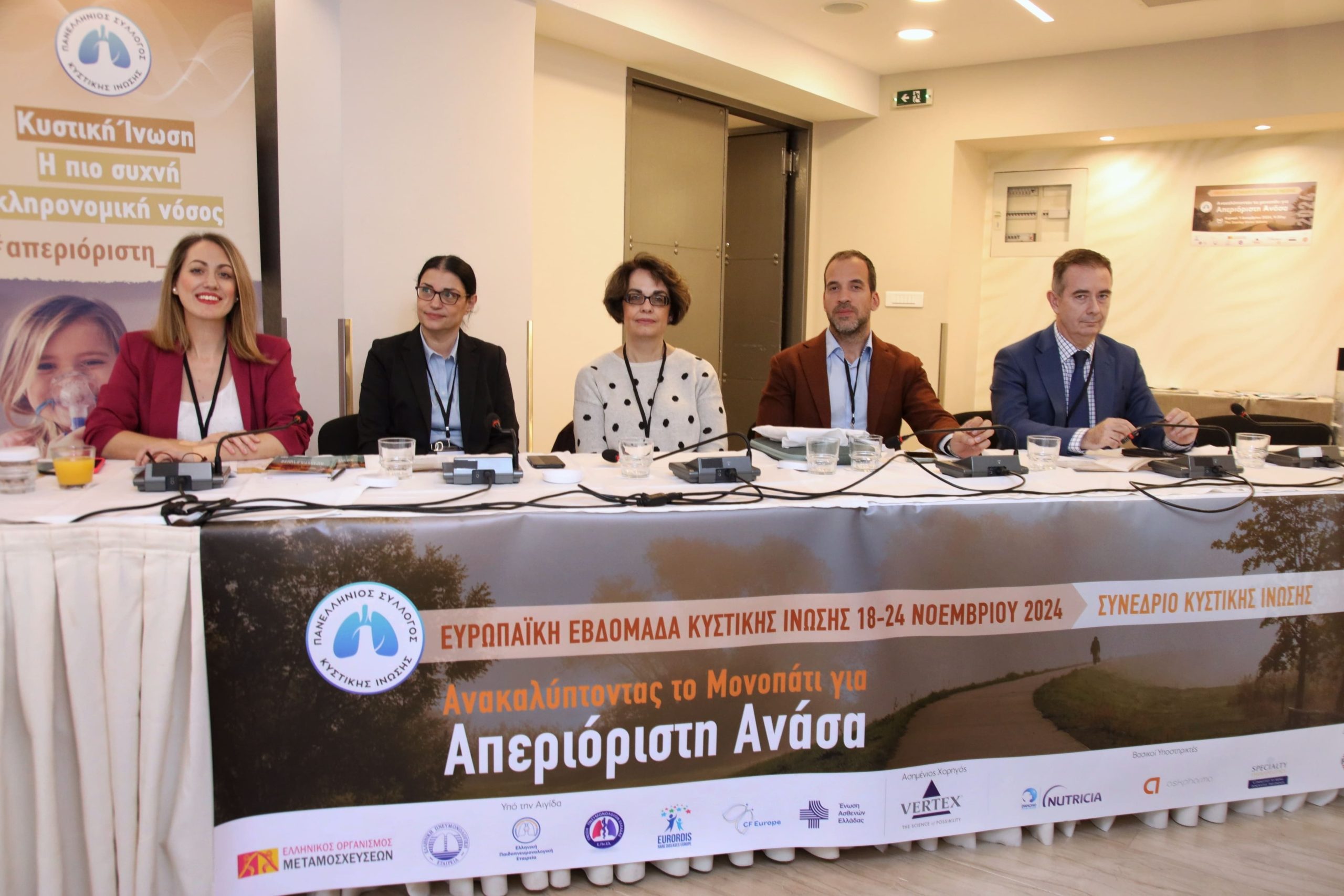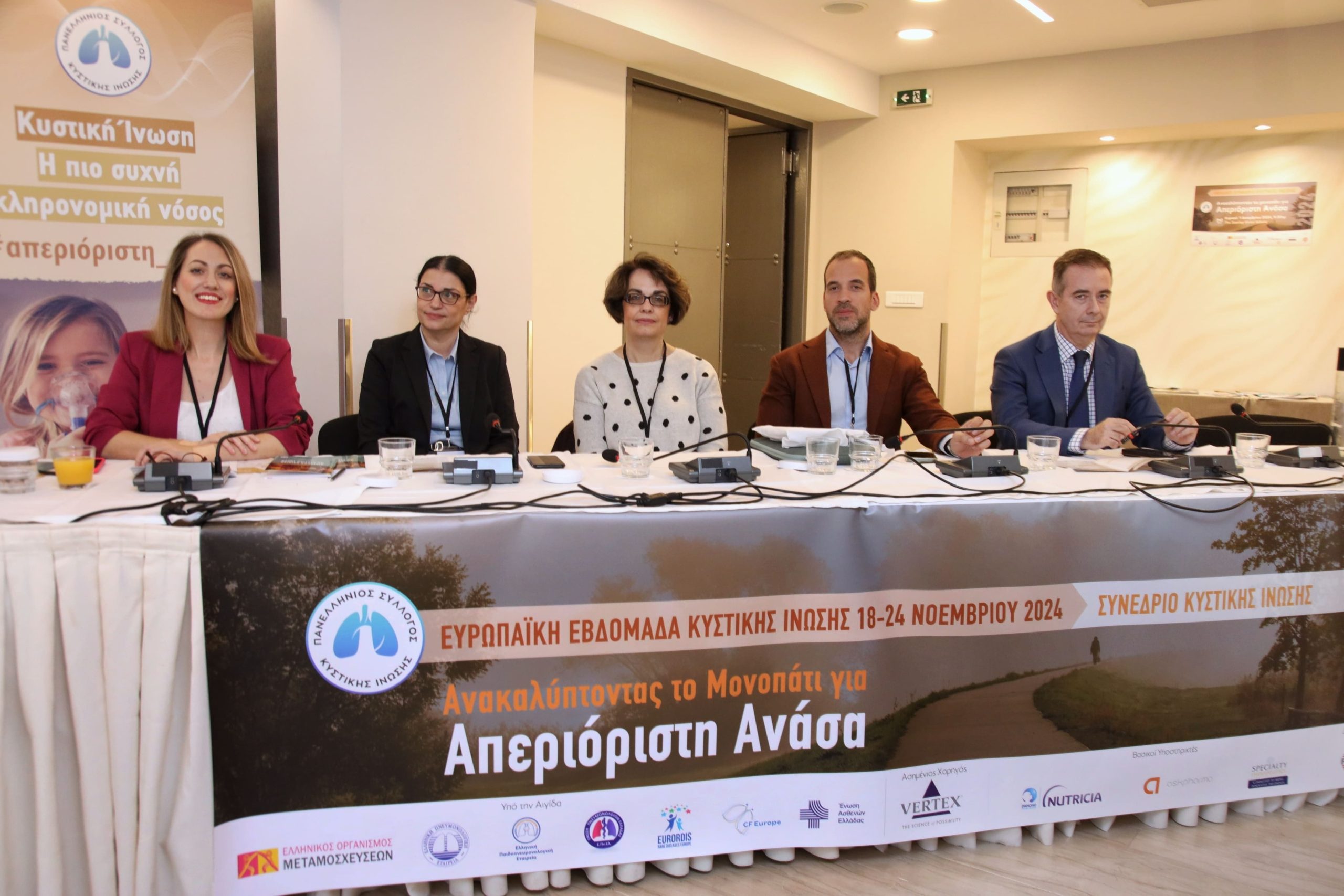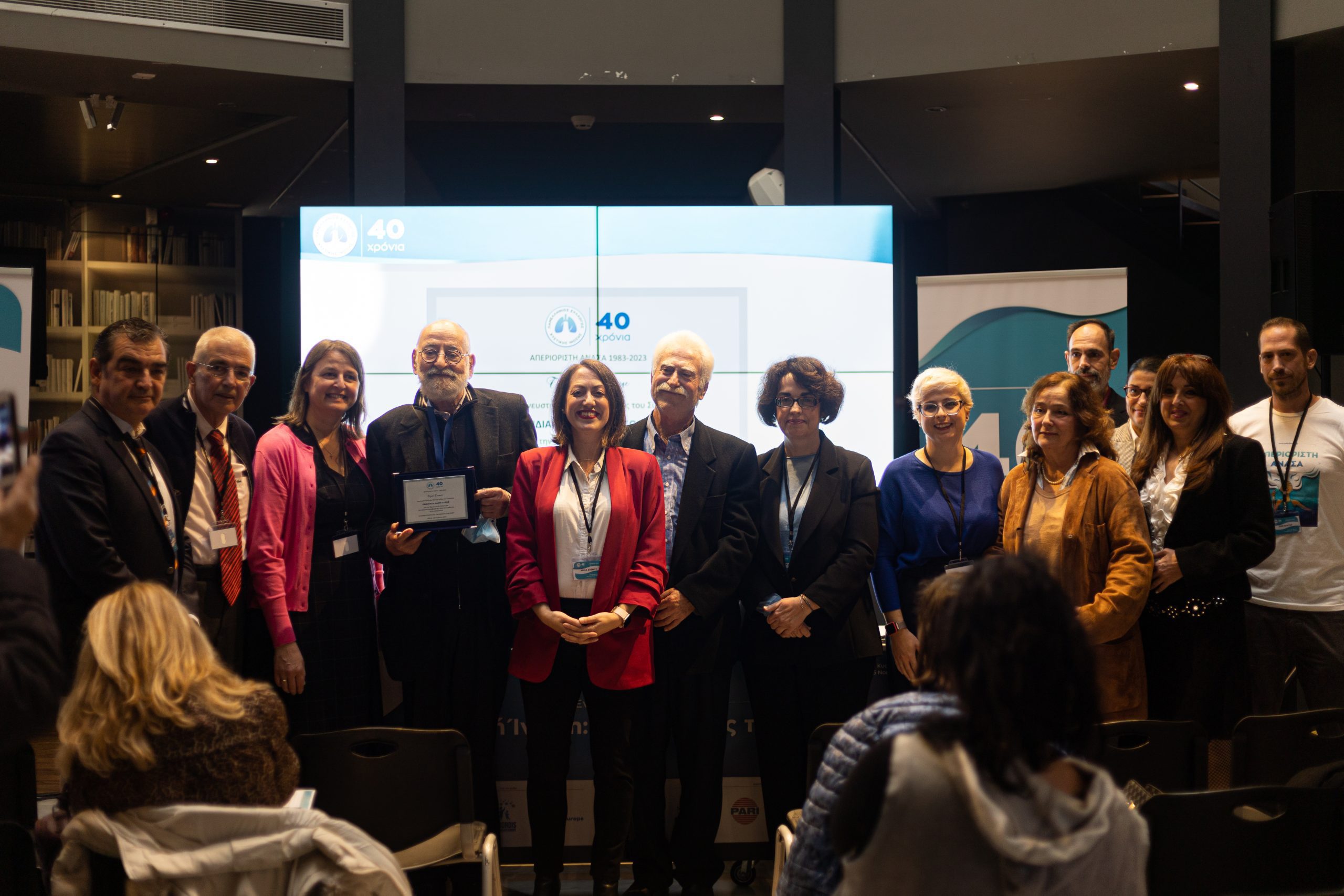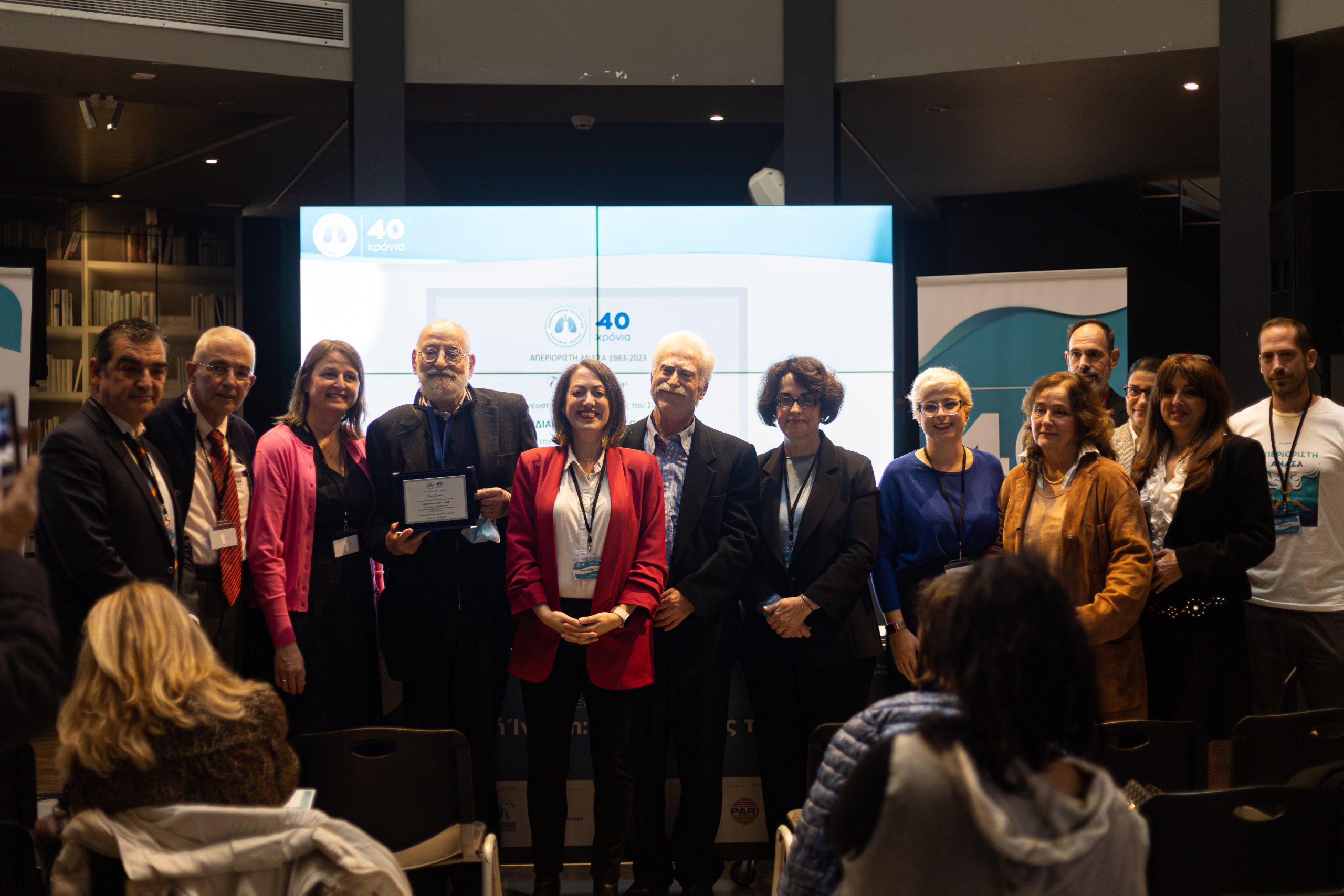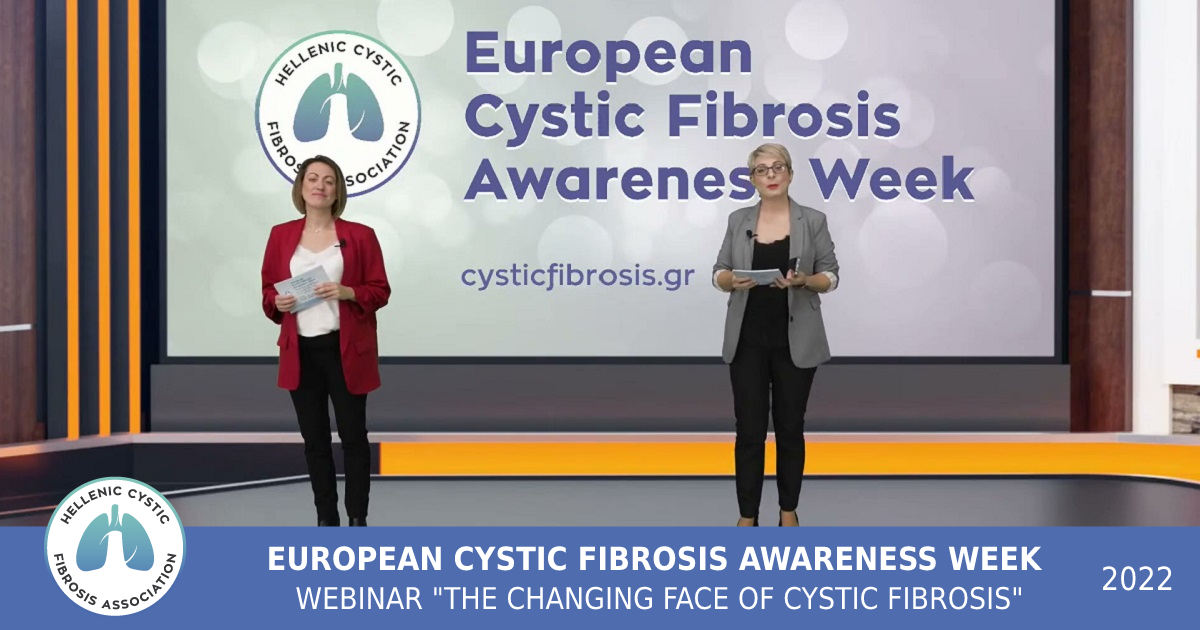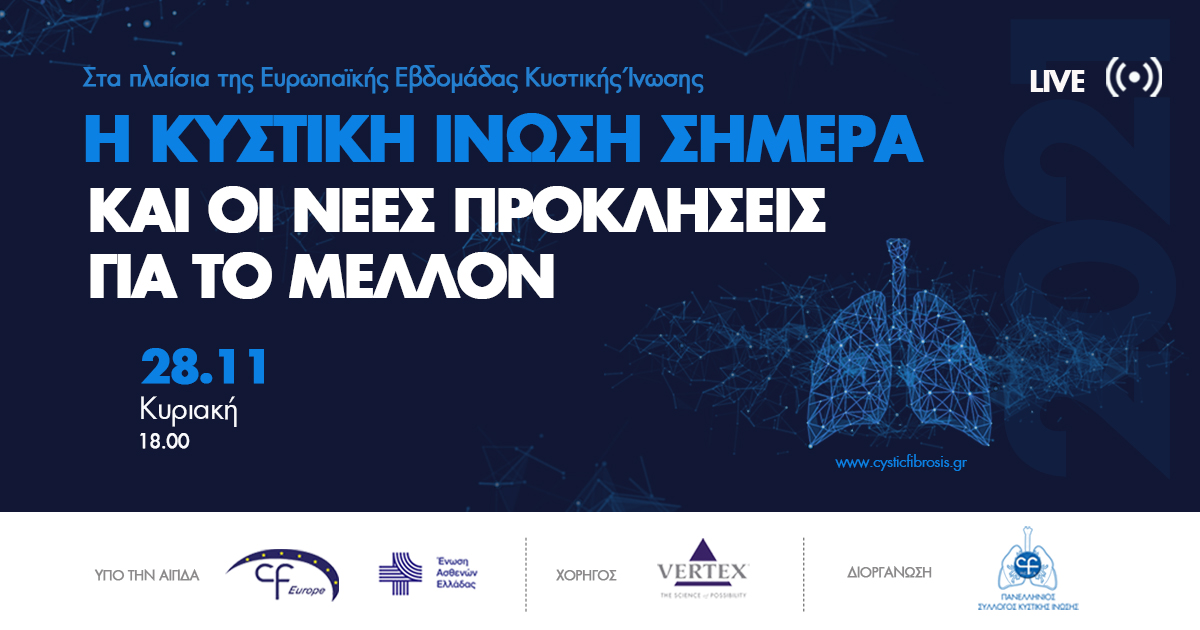Conclusions from the Panhellenic Congress of Cystic Fibrosis 2024
The Panhellenic Cystic Fibrosis Conference “Discovering the Path to Unlimited Breath” was held with great success, on Sunday 1st December 2024, at The Stanley Hotel Athens.
The conference was organized by the Panhellenic Cystic Fibrosis Association in the framework of the European Cystic Fibrosis Week 18-24 November 2024, under the auspices of the Hellenic Transplantation Organisation, the Hellenic Lung Society, the Hellenic Paediatric Lung Society, the Hellenic Lung Association, EURORDIS-Rare Diseases Europe, CF Europe and the Greek Patients’ Association.
Cooperation with national health bodies
The President of the National Medicines Agency (NDA), Evangelos Manolopoulos, during his address, referred to the impressive developments in the field of Cystic Fibrosis treatment, stressing that “the NDA is trying to contribute with rapid approvals of all drugs and procedures, so that new treatments reach patients quickly”. He stressed the constant cooperation with the Ministry of Health and the Panhellenic Cystic Fibrosis Association to improve the quality of life of patients, underlining the importance of gene therapy and innovative drugs in improving the lives of patients.
The conference was welcomed by the Director of EOPYY, Theano Karpodini, who referred to the digital transformation in EOPYY to reduce bureaucracy and better use of health data, as well as the home delivery of medicines, which was launched as a pilot for patients with Cystic Fibrosis. He stressed that the HHCF is working to strengthen the regulatory framework to address drug shortages, but also to support the Health Technology Assessment and Health Technology Assessment and drug negotiation and procurement processes.
During her address, the Head of the EOPYY’s Pharmaceuticals Directorate, Hara Kani, highlighted the excellent cooperation with the Panhellenic Cystic Fibrosis Association, stating that “the example of Cystic Fibrosis and medicines and early access is a benchmark of the state’s interaction with the patients’ association and access”. At the same time, he announced the expansion of home delivery and cold chain (refrigerated) medicines and the linking of the SSI with e-prescribing and the National C.I. Registry to improve services to patients.
International partnerships
The conference was welcomed by the CEO of Eurordis-Rare Diseases Europe, Virginie Bros Facer, who stressed the importance of cooperation with Greece to improve the care of patients with rare diseases, emphasizing that “early diagnosis is very important for children with Cystic Fibrosis and the launch of newborn screening in Greece is a big step to ensure early care”. She also highlighted the contribution of the National Patient Registry and the specialised centres in sharing best practices across Europe, ensuring the best possible care for patients and their families.
Cystic Fibrosis Europe’s CEO, Hilde de Keyser, in her welcome address referred to the great progress that has been made in recent years in the lives of Cystic Fibrosis patients, but also to the challenges that remain, such as drug shortages and the need to improve access to treatments. He stressed the importance of unity and cooperation at European level, stating that “together we can change the world in an important way. Only if we are united can we ensure that no Cystic Fibrosis patient is left behind.
The conference was welcomed by theRepresentative of the European Cystic Fibrosis Registry ECFSPR, Prof. Lutz Nährlich, who referred to the improvement in data collection and quality from Greece’s participation, noting that “the Registries are an excellent tool that allows us to answer critical questions and address challenges that will arise in the future”. At the same time, he underlined the ongoing effort to further improve the data, thanking the Greek community for its contribution.
During her address, the Second Vice President of the Hellenic Patients’ Association, Memi Tsekoura, stressed the importance of information and well-founded information about serious diseases such as Cystic Fibrosis and the need for a change in health culture. She stressed the role of the Association as an official interlocutor of the state from 2022 and congratulated the Association for its awareness campaigns, which contribute to prevention and proper information of the population.
Transplants
The President of the Onassis Foundation, Antonis Papadimitriou, welcomed the conference, highlighting 2024 as a milestone year for organ donation and transplantation in Greece, with important initiatives such as the local coordinators programme and the promotion of organ donation in the public debate. He stressed the importance of cooperation between doctors, institutions and patient associations, expressing the hope that 2025 will see even greater progress in the joint effort to save more lives.
In his address, the President of the Hellenic Transplantation Organisation (HTO), Georgios Papatheodoridis, referred to the progress that has been made in organ donation in Greece, with 2024 setting a record, exceeding 100 donors. “We started with about 4 donors per million population, now we have exceeded 10, but we need to reach 20, because this is the obvious thing to do,” he said, noting that staffing the organization with new coordinators and the cooperation of all agencies are crucial for the continuous improvement of the transplant system.
The President of the Onassis Heart Surgery Centre, Ioannis Boletis, in his address, referred to the great progress made in the lung transplantation programme in Greece, which was based on the cooperation with the Vienna centre and the financial support of the Onassis Foundation. “We quickly overcame the difficulties, and our programme is operating with very good quality and outcome indicators, reaching international standards,” he said, underlining that the annual survival of transplants has reached 92%. He stressed that the increase in organ donation and the strengthening of structures will allow more patients to benefit.
Preventive control
The conference was welcomed by the President of the Institute of Child Health, Christina Kanaka-Gantenbein, who stressed the importance of neonatal screening for Cystic Fibrosis, underlining that “early diagnosis through neonatal screening allows children to have better respiratory function, shorter hospital stay, better nutrition and, consequently, more effective treatment”. He presented the positive results of the pilot programme in Greece and the aim to consolidate and expand it for the benefit of all children in the country.
In her address, Maria Tzeti, Head of the Cystic Fibrosis Laboratory of Medical Genetics of the University of Athens, presented the work of the Laboratory in Greece, pointing out the significant heterogeneity of genetic variants that makes diagnosis difficult in the Greek population. “Molecular diagnosis in Southern Europe and Greece is much more difficult… Therefore, we have many other pathogenic variants that we need to detect in molecular testing.” He explained the importance of prenatal and preimplantation screening, and referred to the advances in treatments that increase survival rates and significantly improve the quality of life of patients with CF.
National Cystic Fibrosis Registry
The Data Protection Officer of the Ministry of Health, Dimitris Zographopoulos, during his welcome speech, referred to the operation of the National Cystic Fibrosis Registry, stressing the importance of cooperation with the European Registry for the comparative registration and evaluation of the disease. He pointed out that “we are not interested in the simple registration of patients, but mainly in being able to provide effective services to patients with Cystic Fibrosis”. He also referred to the pilot programme of neonatal EPEN screening, which is expected to be completed in 2025 and integrated into the permanent programmes, providing important data to improve health services.
In her address, the Head of the Department of Therapeutic Protocols and Registries of the Ministry of Health, Panagiota Mitrou, referred to the operation of the National Registry of Patients with Cystic Fibrosis, stressing that “now more than 95% of patients suffering from the disease have been registered in the Registry”. She underlined that the Registry is a digital tool for mapping patients’ needs and formulating health policies, while it is also interconnected with the European Registry, allowing for data comparison and improvement of care at national level.
The Coordinator of the National Cystic Fibrosis Registry and Scientific Director of Hospital at Home, Ioannis Chanakas, in his address, referred to the significant progress that has been achieved in recent years in the care of patients, with the creation of specialized centers and the operation of the National Registry, stressing: “If it wasn’t for the Registry, we wouldn’t have the innovative treatments.” He also highlighted the success of the home care programme, which has radically changed the quality of life of patients, and expressed optimism for the future, saying: “In recent years, there is no longer an expiration date on Cystic Fibrosis”.
The event was welcomed by the Member of the Board of Directors of the Hellenic Pulmonary Society (HPS), Charalambos Moschos, who stressed the need to strengthen adult centres, as he said the centres are few and understaffed. He referred to the scholarships provided by the EPE for the training of young pulmonologists to staff existing and new centres and pledged continued support for the work of the Society and patients.
The President of the Hellenic Association of Pulmonologists (EPNEL), Stamatoula Tsikrika, welcomed the conference, declaring the support of the Association and stressing that it is by the side of Cystic Fibrosis patients at all times with its high scientific level and empathy.
The greetings section was concluded by the retired pediatrician of the Department of Children’s Hospital – Agia Sophia, Stavros Dountounakis, who referred to the significant progress in the treatment of Cystic Fibrosis, saying that “what once existed only in our imagination, now becomes reality”. He expressed his optimism for the future, noting that the unpleasant and difficult years have been forgotten, as new treatments have brought hope and life. He stressed the need to cover the 10% of patients who still do not have access to treatments and concluded by saying that, now, “we look to the future with a smile, pleasure and strength”.
In summary:
- New Developments in Treatment: CFTR Modulator Protein Modifiers (triple combination) have dramatically changed the prognosis and quality of life of Cystic Fibrosis patients by improving respiratory function, infections and nutrition.
- Early diagnosis through Neonatal Screening: The importance of preventive neonatal screening, now being piloted, leading to early diagnosis and better management of the disease was highlighted.
- Interconnection of the National and European C ystic Fibrosis Registry: the interconnection of the National Cystic Fibrosis Registry with the European Registry allows comparative data on the disease, achieving more effective care planning.
- Improved Life Expectancy: the life expectancy for children born today with Cystic Fibrosis has increased to 61 years, highlighting the importance of new treatments.
- Challenges in Adults: The increasing care needs of adult patients with chronic complications such as metabolic syndrome, osteoporosis and neuropsychiatric disorders were presented. It was also mentioned that with increasing life expectancy, adult patients are facing new issues such as obesity, increasing diabetes mellitus, malignancies, etc.
- Lung transplants: patients who have undergone a lung transplant need specialised regular monitoring to manage complications. At the same time there has been a significant decrease in transplants due to new treatments, but patients who reach transplantation are older and with co-morbidities.
- Need to Strengthen Adult Centres: as the survival rate of patients is increasing there is an urgent need to staff adult Cystic Fibrosis Centres.
- Holistic Child Care: A holistic approach to treating children with a focus on nutrition, physiotherapy and psychosocial support is considered crucial for their development.
- Hope for Gene Therapy: Encouraging results were presented for the application of gene therapies currently in clinical trials for patients not eligible for CFTR Modulator therapies.
- Improved Greek Data: Data from the National Cystic Fibrosis Registry show that Greek patients have similar or better respiratory function and nutrition compared to other European countries.
- Psychosocial Support: Psychological care and the integration of physical activity programmes were identified as important pillars for patients’ quality of life. At the same time, the positive results of the cognitive behavioural psychotherapy group programme for patients and caregivers for the period 2023-2024 were presented, as well as the Cystic Fibrosis Support Hotline “Unlimited Breath”, developed by the Panhellenic Cystic Fibrosis Association in the context of psychosocial support activities.
During the conference, patients and caregivers shared their experiences of living with Cystic Fibrosis and lung transplantation.
Speakers of the Conference were: Lillian Venetia Vildiridis, Secretary General of Health Services, Evangelos Manolopoulos, President of the National Organization of Medicines (EOF), Theano Karpodini, Director of EOPYY, Hara Kani, Head of the EOPYY Pharmaceuticals Division, Virginie Bros Facer, CEO Eurordis-Rare Diseases Europe, Hilde de Keyser, CEO Cystic Fibrosis Europe, Prof. Lutz Nährlich, Representative of the European Cystic Fibrosis Registry ECFSPR, Memi Tsekura, Vice President of the Hellenic Patients’ Association, Antonis Papadimitriou, President of the Onassis Foundation, Georgios Papatheodoridis, President of the National Transplantation Organisation, Ioannis Boletis, President of the Onassis Cardiac Surgery Centre, Christina Kanaka-Gantenbein, President of the Institute of Child Health, Maria Tzeti, Head of Cystic Fibrosis, Laboratory of Medical Genetics, University of Athens, Dimitris Zographopoulos, Data Protection Officer of the Ministry of Health, Panagiota Mitrou, Head of the Department of Therapeutic Protocols and Registries of the Ministry of Health, Ioannis Chanakas, Coordinator of the National Cystic Fibrosis Registry, Scientific Officer of the O.E. Hospital at Home, Charalambos Moschos, Representative of the Hellenic Lung Society, Stamatoula Tsikrika, President of the Hellenic Lung Association, Hadjiagorou Elpida, Professor of Pediatrics – Pediatric Pediatric Lung Diseases, Aristotle University of Thessaloniki, Greece, Head of the Cystic Fibrosis Unit of the General Hospital “Hippokratio”, Petrochilou Argyri, Pediatrician – Pediatric Pulmonologist, Attending Nurse A’, Department of Cystic Fibrosis, Children’s Hospital “Aghia Sophia”, Fotoulaki Maria, Professor of Pediatric Gastroenterology, Aristotle University of Thessaloniki, Director of Pediatric Gastroenterology, Hepatology and Nutrition, General Hospital “G. Papageorgiou”, Emmanuel Paraskakis, President of the Hellenic Society of Paediatric Pulmonology, An. Professor of Pediatrics, University of Crete, Head of the Cystic Fibrosis Clinic for Children, University General Hospital of Heraklion, Crete (PEPAGNI), Katsagoni Christina, MSc, PhD, Clinical Dietitian-Nutritionist, General Hospital of Heraklion. Gambetta Anastasia, MD, PhD, MSc, Paediatrician, Doctor of Medicine of the Aristotle University of Thessaloniki, MSc – Applied Nutrition and Health Promotion, Diamantea Filia, Pulmonologist, Director of the NHS, Manika Katerina, Associate Professor of Pulmonology and Pneumology at the Aristotle University of Thessaloniki, Center for Cystic Fibrosis in Adults, Pulmonary Clinic of the Aristotle University of Thessaloniki, General Hospital “G. Papanikolaou”, Pitsidianakis Georgios, Director of the Pneumonology Department, Head of the Adult Cystic Fibrosis Clinic, University General Hospital of Heraklion of Crete (PEPAGNI), Tsagaris Hercules, Professor of Pulmonology – Intensive Care, University of Athens, Director of the Intensive Care Clinic of Attikon, Scientific Manager of the Lung Transplantation Center of the Onassis Cardiosurgery Center, Theodoropoulos Fotis, Attending Lung Surgeon, Onassis Cardiosurgery Center, Spinou Anna, President of the Panhellenic Cystic Fibrosis Association, Member of the Working Group of the National Cystic Fibrosis Registry, Member of the Board of Directors of the National Cystic Fibrosis Registry.Member of the Board of Directors of Eurordis- Rare Diseases Europe, European Patients’ Academy (EUPATI) fellow, Rakitzi Stavroula, Dr.., Dipl.-Psychologist Clinical psychologist with competence in Cognitive Behavioral Psychotherapy, Head of the group psychotherapy program of the Panhellenic Cystic Fibrosis Association, Atsave Eleni, Psychologist, MSc Medical School “Health Education and Health Promotion”, Head of the Helpline program “Unlimited Breath” of the Panhellenic Cystic Fibrosis Association, Saltouridou Eleni, Social Worker, Head of the Helpline program “Unlimited Breath”.
Their stories were shared by patients Toula Voulgaridou, Christos Bramis, Marilena Tsentidou, Anna Spinou, Georgios Koumakis, Vivi Katsanou and the caregivers Eftichia Psyla, Eva Bourani.
Many thanks:
- To all the speakers and participants who shared their knowledge and experiences, giving hope and strength for a better tomorrow.
- To photographer Yannis Gkogopoulos for his invaluable contribution, as well as to CONEQ Hellas and Antonis Vlachos for the excellent coverage of the conference.
- To Silver Sponsor Vertex Pharmaceuticals, Key Supporters Nutricia Danone, Special Therapeutics, Askpharma and Donor PARI for making the conference a reality.

